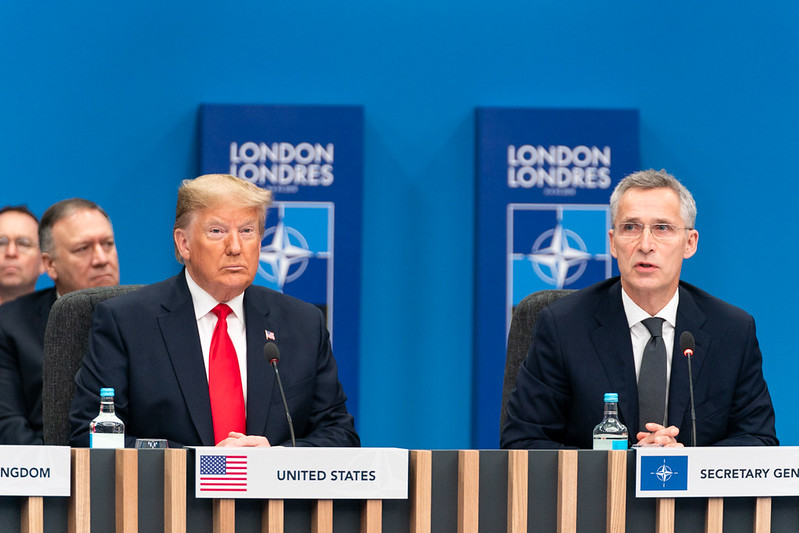
President Donald J. Trump attends the North Atlantic Treaty Organization plenary session Wednesday, Dec. 4, 2019, with NATO Secretary General Jens Stoltenberg and the British Prime Minister Boris Johnson at the 70th anniversary of NATO in Watford, Hertfordshire outside London. (Official White House Photo by Shealah Craighead)
With a statement in a recent speech about NATO partners not paying their fair share on defense, Donald Trump has reignited the debate over whether or not Americans should be treaty-bound to protect nations who don’t even meet the minimum requirement of spending 2% of GDP on their own defense. In The Spectator, Daniel DePetris discusses the logic behind the argument, writing:
The Europeans are right to be nervous. But in a way, they only have themselves to blame. While Americans may not want the US to get out of NATO, they do find it objectionable that the US is doing most of the legwork in keeping Europe whole, free and at peace while the rest of the alliance — Britain, Poland and the Baltic states excluded — basically resembles a bunch of twenty-five-year-old couch potatoes sitting in their parents’ basement, taking indefinite support for granted. Sure, this analogy will make a lot of Europeans upset, but how else to describe a situation in which almost two-thirds of NATO members are still failing to meet NATO’s 2 percent of GDP metric nearly seventeen years after it was first established? To believe a continent with a $17 trillion GDP doesn’t have the financial resources to fulfill those obligations is ludicrous, and we shouldn’t pretend otherwise.
Trump creates binaries in the conversation, regardless of the issue at hand. His rant last weekend is no exception. One side is appalled by what he said, not only due to his incitement of a Russian invasion of European territory but also over his ignorance of how NATO actually works. The other side, largely supporters in the conservative media and former officials in his prior administration, insist that Trump’s toughness was the only reason NATO allies started getting at least a little serious about their own defense. As usual, both sides embellish their points for the sake posterity.
But believe it or not, this isn’t a black-and-white affair. There are zones of truth sprinkled underneath the outrage.
The outrage is pretty obvious: signaling to Russia that Europe is fair game undermines the strategy of deterrence that underlines NATO’s entire purpose. You don’t need to be reciting NATO gospel every day to understand this. If the goal of this rhetoric is to scare Europeans straight, well, that’s unlikely to work either. Trump’s words don’t often correlate to his policies; he had a ball jousting with fellow NATO allies during summits and thought about withdrawing the US from the alliance, yet ultimately presided over NATO’s expansion and even pondered setting up a large, permanent US military base in Poland. In other words, we shouldn’t assume as so many do that Trump would back up his words with action. Maybe he would, maybe he wouldn’t.
Yet Trump isn’t wrong to be ticked off about how NATO is working. He isn’t even the first US president to express disdain. In November 1959, ten years after NATO’s creation, then-president Dwight D. Eisenhower told one of his generals that European members were in essence playing the US for fools. A decade later, defense secretary Melvin Laird wrote to Richard Nixon that the US “has told its Allies for the past several years that they can and should take over a greater share of Europe’s direct defense.” Ditto Barack Obama, who bluntly told the Atlantic during a wide-ranging interview that “free riders aggravate me.” The subtext didn’t take much parsing: Europe has grown too dependent on the US military, making it comfortable and lethargic.
Read more here.
If you’re willing to fight for Main Street America, click here to sign up for the Richardcyoung.com free weekly email.





